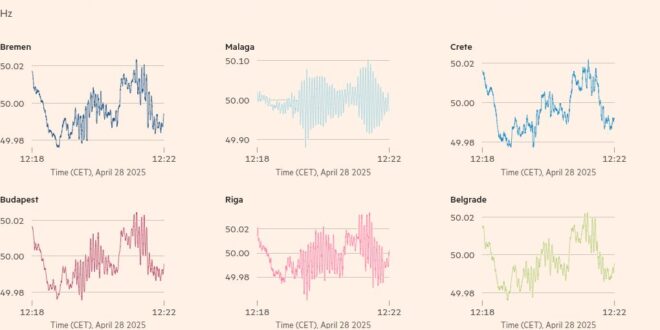This is a version of the Energy Source newsletter that appears on our site. Subscribers can sign up for the newsletter. here Subscribe to the newsletter and receive it every Tuesday and Thursday. Upgrade to Premium or browse all FT Newsletters here for Standard subscribers
Energy Source has arrived from London and Madrid.
More than a month has passed since Spain and Portugal experienced a devastating power outage, which caused disruptions to trains, businesses and schools as well as communication on the Iberian Peninsula.
The system was largely restored by the early hours on Tuesday. It collapsed shortly after 12.30pm Spanish Standard Time, April 28.
After the event, there was no explanation. However, speculations followed, with questions about whether operators did enough to prepare for the high amount of renewable energy.
Several helpful details, including this, have been made public 43 days after the event. timeline From the European Network of Transmission System Operators for Electricity.
The following half-hour is a calamitous one on Spain’s electricity grid (times are in CET).
-
12.03-12.07: The Spanish and Portuguese electricity systems are affected by oscillations in power and frequency.
-
12.16-12.22: The European grid is able to deal with inter-area oscillations, even if they are as far as Latvia. This can be done by reducing the power flow between France and Spain. Uncertain is whether these factors contributed to the events that followed.
-
The 1232.57, the 12.33.16, and the 12.33.17 are all: Three generators trip in the south part of Spain, which amounts to a loss 2.2 gigawatts. (roughly 2mn homes’ worth of electricity).
-
12.33.18-12.33.21: In southern Spain, the voltage rises sharply. It sets off another “cascade” where other power plants trip off. The frequency which must always be in balance, begins to fall. Generators are programmed to shut down if frequency drops below a certain threshold, creating a cycle.
-
12.33.19-12.33.22: The power systems of Spain and Portugal are out of sync with the rest the European grid. Automated stabilisation measures kick in. Entso-e stated that these measures are “unable” to prevent the collapse the Iberian Power System.
It is possible to identify a surge of voltage as a major cause of the crisis by looking at the timeline. This surge may have been caused by a surge in voltage, due to the fact that the first three generators were no longer able to absorb any reactive power.
But there remains no information about what caused the loss of generation in the first place — nor which generators they were — leaving other power system operators at a loss for how they might prevent future cuts.
According to Janusz Bialek of Imperial College London, an expert on power systems, three separate losses in generation at the same moment is unusual. It suggests that there may be a common cause.
The system also isn’t set up to deal with so many failures simultaneously. He adds that “Power utilities use the (N-1) safety criterion, which means that a failure of one element (transmission lines or power stations) shouldn’t cause any problems.” Three were involved in this case.
There will be millions and millions of data points. Power systems are becoming increasingly complex machines. Entso-e warned that its investigation could be delayed due to the unwillingness of third parties to share their data.
“Red Eléctrica (Spain’s grid operator) recently informed us of the reluctance of the third parties to share the relevant data, which could lead to potential delays in the investigation of the Expert Panel,” it said in a letter Sara Aagesen, the Spanish Minister of Energy and Environment, last week.
The third parties claim that they are legally bound to confidentiality obligations.
Meanwhile, the public blame game over the blackout is becoming increasingly acrimonious as Red Eléctrica and the biggest utility companies point fingers at each other for what went wrong.
The confrontation began last month when Beatriz Corredor, chair of the parent of Red Eléctrica, declared that some large plants — using gas, nuclear or hydro power — had not done their job in helping to control voltage on the grid in the moments before the outage, as the Financial Times first reported.
She doubled back a week after, repeating the accusation and declaring her team had done nothing wrong.
“Our grid did not fail,” Corredor told La Vanguardia newspaper — the “our” being a possible allusion to the fact that Red Eléctrica controls the high-voltage transmission grid but the utilities operate the distribution grid that carries power to end users while also running power stations.
She continued: “There was not a failure of operation.” It was not possible to have an excess of renewables with synchronised power without the connection. We know there was also sufficient inertia.
At a conference on May 29 she said “at Red Eléctrica we don’t do experiments”, her way of rebutting a report in The Telegraph that on the day of the outage Spain was probing how far it could push its reliance on renewables.
Iberdrola has been the leader in fighting back against Corredor’s accusations.
Mario Ruiz-Tagle said, “We were singled out right from the start,” last month. But he declared that Red Eléctrica had been recording excess voltage in the days before the blackout and that voltage on the grid operator’s lines was above normal levels just before the collapse.
“Before the event, during it and after it” [Iberdrola] The protocol and regulations set by the [energy and environment ministry] and by the system operator, Red Eléctrica, which is ultimately responsible for keeping the lights on in the country,” he said.
Miguel Stilwell d’Andrade – the chief executive officer of EDP, the largest Portuguese utility – spoke to the FT in recent days. He avoided blaming anyone, but said that there were still “lessons to be learned” even though the cause of the blackout is yet to be identified.
He said that Spain needs more interconnections with France, as well as more storage of electricity and a more sophisticated management technology.
“I believe that people have understood the message. Now it’s time to make this happen.” (Rachel Millard & Barney Jopson).
Sunny side up
Sunnova Energy, a residential solar panel installer in the US, filed for Chapter 11 bankruptcy on Sunday after raising concerns about its finances back in April.
Solar Mosaic was the first US company to file Chapter 11 bankruptcy in this month. Residential solar in many countries had a challenging 2024, as growth slowed and incentives were reduced.
In a bankruptcy filing filed in Texas, Sunnova’s CEO Paul Matthews stated that “tariffs” and the uncertainty of the country’s commitment to promoting solar energy generation were also casting a dark shadow on the US industry.
The tariffs imposed by President Donald Trump could increase the cost of solar panels in the US. Meanwhile, industry groups say that the possible early termination of tax credits for homeowners who install solar panels will be a major blow.
Solar Energy Industries Association: “Each rooftop solar installation represents a further step in the direction of true American independence from foreign energy sources.”
Sunnova Energy’s failure could be a preview of what’s to come. (Rachel Millard)
Power Point
Energy Source was written and edited Jamie Smyth and Martha Muir with assistance from the FT’s global team. You can reach us at energy.source@ft.com You can follow us at X. @FTEnergy. View past newsletters here.
You can find useful newsletters on this page
Moral Money — Our unmissable newsletter on socially responsible business, sustainable finance and more. Sign up here
The Climate Graphic: Explanation — Understanding the most important climate data of the week. Sign up here
 Costa News Spain Breaking News | English News in Spain.
Costa News Spain Breaking News | English News in Spain.









